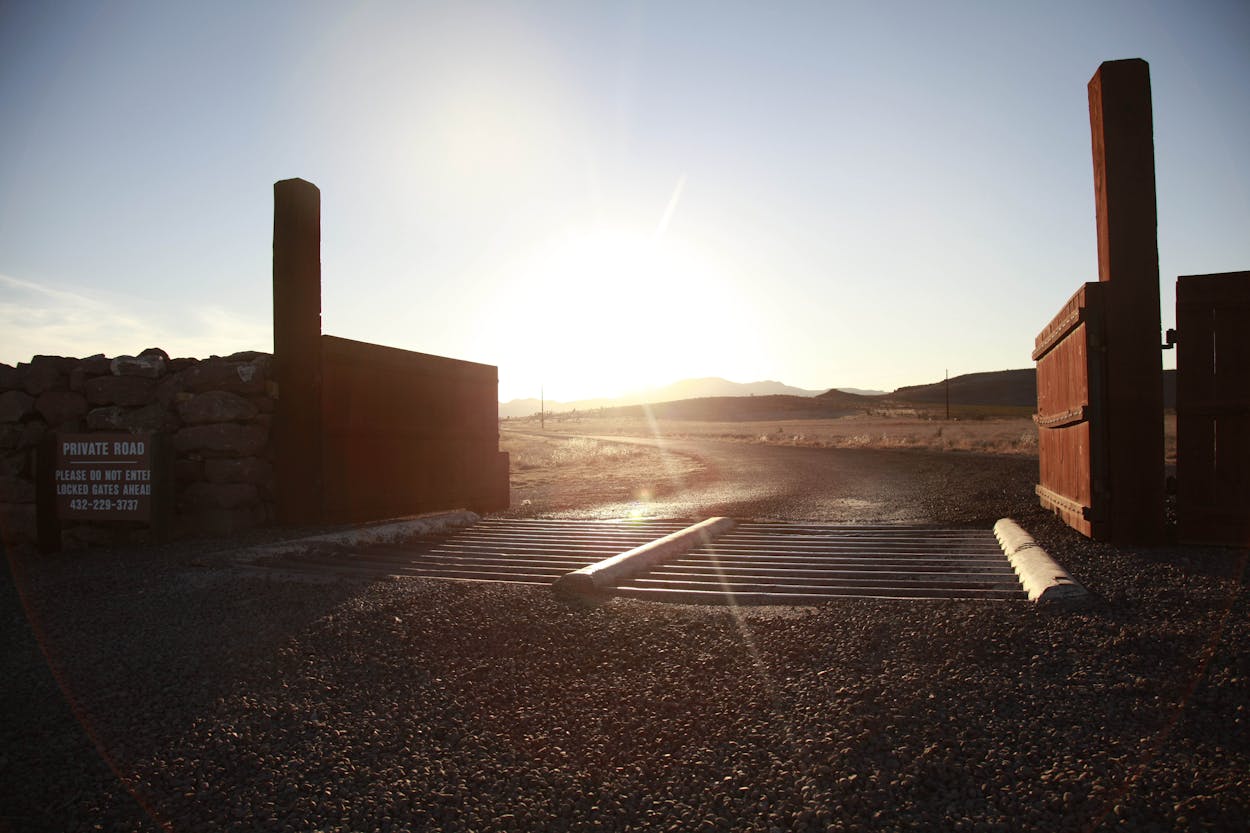Just hours after news of Antonin Scalia’s death set the media mill on fire, I pulled over on the shoulder of Highway 67 opposite the walled entrance of Cibolo Creek Ranch, where the Supreme Court Justice had passed.
It was impossible to tell that anything had happened, much less something of such critical political impact. In this remote part of West Texas, the urgency of breaking news is offset by the vastness of space, the languid pace, and a very real lack of cell phone reception. Luckily, around Cibolo Creek, there is a patch of service—a detail that anyone who drives this length of road regularly knows.
I live just 30 miles south of the ranch in the 6,000-small border town of Presidio, one of two cities that resides within the sparsely populated but expansive Presidio County, which unwittingly became the news cycle’s focal point in the days following Scalia’s passing.
When I arrived at the ranch, I’d expected to find some sign of activity—police tape, law enforcement vehicles—but instead met a wiry middle-aged man named Frank, who stood alone beside a burgundy Suburban parked before the entrance. He had been tasked with restricting access to the dirt road leading to the ranch headquarters and hotel. When I asked him for information about the Justice, he smiled and shook his head.
There was only one other vehicle parked on the road, which belonged to Marfa Public Radio’s Tom Michael. Out here, the quiet is so all encompassing that, standing in the middle of the highway, it’s almost impossible to hear an oncoming vehicle until it’s already passed you by, but I could hear Michael’s voice from within his car as he recorded a news byte for the radio station.
I stood on the double yellow lines that divided the road and took a photo of the scene before me—Frank, the ranch entrance, and the Texas flag that thrashed above it—all of which seemed to betray the scale of what had just happened.
Days later, conspiracy theorists cried foul play. Pundits criticized the way in which the county handled the justice’s death by calling to question Presidio County Judge Cinderela Guevara’s decision not to order an autopsy. They raised an eyebrow over the fact that she pronounced him dead remotely while the sheriff—at the scene—conveyed the specs of the deceased judge’s condition to her over the telephone.
But most of us who were watching from Far West Texas didn’t bat an eyelash. The procedures that the rest of America deemed most suspicious were the sorts of things we’ve grown accustomed to. When you live out in the desert of West Texas—the kind of place where a house might burn down before the fire department has time to even get there, and where the closest hospital is a 90-mile drive away—you learn to make do with what you’ve got.
For Justice Scalia, the place was a respite. The vast and illustrious Cibolo Creek Ranch—complete with a pair of camels you can sometimes see grazing from the highway—is a veritable playground for those who come to escape the city rigmarole.
The downside of this degree of remoteness, however, is a lack of resources, protracted waits, and sometimes, convoluted methods for achieving seemingly simple tasks. Dominguez inadvertently found himself in the midst of a controversy when, called to action after news of Scalia’s death, he did what he’d do with any other dead body—given the circumstances.
“It’s an isolated place,” said Presidio County Sheriff Danny Dominguez, who has served as the county’s sheriff for the past 20 years, and was the first law enforcement official to respond to the scene. “We don’t have the resources. We do what we do with what we have,” he said. Dominguez and his six deputies are responsible for overseeing the 3,856-square miles that comprise the county, including 108 miles of the border with Mexico.
Dominguez said he was in the middle of cleaning his yard on Saturday, February 13, when he got the call from dispatch informing him that Texas businessman John Poindexter, who owns the 30,000-acre luxury resort ranch, needed help. Dominguez passed along the contact information of the U.S. Marshals and set on his way to the ranch, a 30-minute drive south of Marfa, where Dominguez lives.
When Poindexter couldn’t connect to the U.S. Marshals office, Dominguez received another call from dispatch. This time, he spoke to Poindexter himself. “He said, ‘Danny, I need the number for the Marshal,” Dominguez recalled. “I said, ‘What for?’ He said, ‘I have a dead body at Cibolo.’”
“I said, ‘Mr. Poindexter, that’s under my jurisdiction. That’s my deal—why do you want the Marshal?’” Dominguez said. “He goes, ‘Danny this is beyond yours. It’s big.’”
It was on his way to the ranch that Dominguez discovered just how big. Calls from reporters started coming in and “it went downhill from there,” Dominguez said. Before long, the San Antonio Express-News broke the story, which snowballed into oblivion.
Dominguez arrived at the ranch, where Poindexter gave him the rundown of the story that, by now, most people who followed the news have heard: Scalia had dinner at the ranch on Friday night and he turned in around 9 that evening. The following morning, when he did not show up to go hunting with the rest of his party, they assumed he was tired and left him be. Later, after he still didn’t show, they found him in his room, already deceased.
“I followed [Poindexter] to the room, and when I got there, he said, ‘This is exactly the way we found him. All we did was take his pulse; he was cold.'” Dominguez remembered.
He added, “I looked around, did my initial investigation. I was looking for anything—any struggles as far as what might have occurred that night. There was nothing there. Everything was in order—from the suitcase to the bed to the sofa, everything was in order. Nothing was on the floor. The sheets weren’t wrinkled. It was like he pulled them over him, and that’s the way he stayed. That was it.”
From his investigation, Dominguez determined that Scalia had died of natural causes, a decision that he still vehemently backs: “I believe my call was the right call, and I’ll stand by it, no matter what anybody says.”
“You have to put it into perspective for people when you’re communicating to people who aren’t from around here,” said Justice of the Peace David Beebe, who was one of the two Presidio County Justices of the Peace who were called to file an inquest for Scalia. Since neither one was immediately available at the time that Scalia’s body was found, the responsibility fell upon County Judge Guevara, who declared Scalia dead over the phone.
“They don’t understand how we do things,” Beebe said.
At over six feet tall and sporting tinted eyeglasses he wears indoors and out, Beebe is hard to miss. When he’s not working as Justice of the Peace and blogging heatedly about county issues, he runs the “Boyz to Men” food truck in Marfa along with a small posse of disaffected young men who manage to turn ordering tacos into an excruciating task.
Along with the other JP, Juanita Bishop, Beebe oversees the paperwork for all the unattended dead bodies that turn up in the county. As JP of a border community, this aspect of his job remains relatively consistent: “Mostly migrants,” Beebe said. “The places they’re found are in areas so remote it’s hard to believe that anybody was there in the first place.”
Such was the case with Gloria Gardilla Rodriguez, a 42-year-old Mexican immigrant whose body was found in a remote area outside the tiny town of Valentine in mid-December of last year. A distress call had been made on her behalf by two undocumented immigrants, who were incapable of giving Rodriguez’s exact location, according to a report published by local newspaper The Big Bend Sentinel. Days later, law enforcement finally found her via air search, but she was already dead.
In that case, Beebe made the call to order an autopsy. “We thought she froze to death,” he said. “Turns out, when we sent her for autopsy, she’d died of extreme gastritis. She had died basically of bleeding ulcers.” He added, “For all those immigrants found out in the field that have been there for a while, you have to order an autopsy. Because there’s no possible way to know their cause of death.”
But in a lot of other cases, the cause of death is fairly straightforward. Beebe treats these deaths with what he believes is a sensible approach: to him there’s no sense in wasting already limited funds on an autopsy that costs the county, at the very least, $2,500 each time. “When in doubt, you need to go for the autopsy, but a lot of times, despite what forensic files and those other TV shows would have you believe, there’s not a lot of doubt,” he said.
As for Scalia, Beebe said he trusted those who made the call. “When Judge Guevara tells me something, I believe her because she’s a credible person. There were credible people there. The U.S. Marshals are credible people; Sheriff Dominguez—even though I don’t like him—he’s a credible person. John Poindexter is a credible person and you have credible information from the doctor. You have the family wishing to not have an autopsy on their own; that’s credible.”
Both Beebe and Dominguez have a matter-of-fact way of talking about death. Maybe that’s because Beebe’s had to use his own SUV as a hearse in the past. Or maybe it’s that while West Texas provides an idyllic sense of escape, escaping West Texas can be a treacherous feat. This is ingrained in the way of life.
For Dominguez, this morbid pragmatism is implicit to his penal philosophy. And the death of Scalia was no different than the death of any other person. “People die, we’re all going to die one day, we just have to take it as it comes,” Dominguez said. “No matter where you’re at, it’s going to happen.”
On the evening after Scalia’s death, as political pundits speculated what his absence would mean for the fate of America, I drove past the ranch—still peaceful, only now the Texas flag flew at half-mast.








